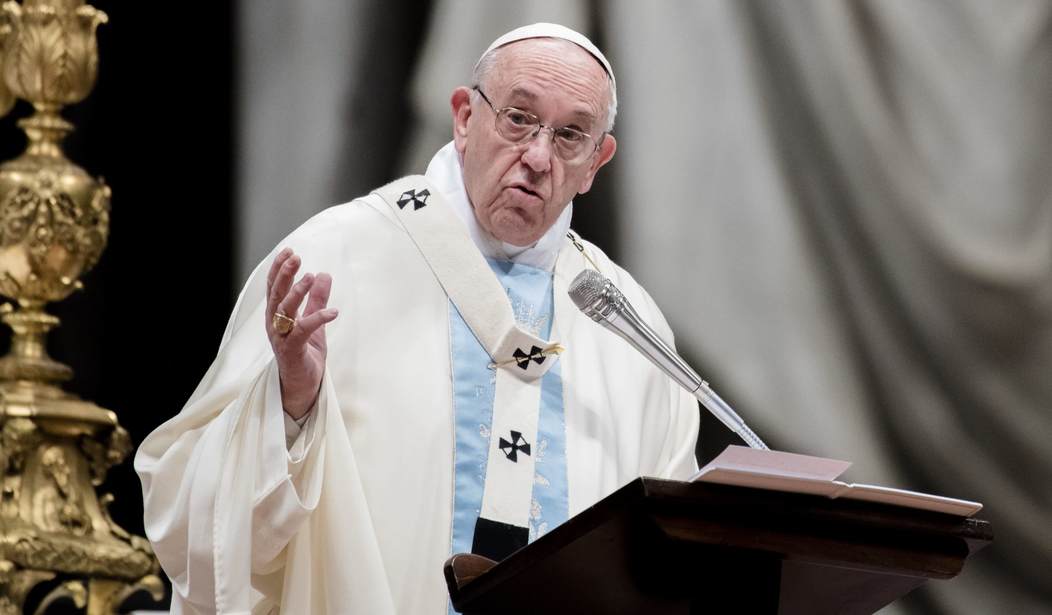Last month, Pope Francis approved a change in the wording of the Lord’s Prayer, the prayer Jesus taught His followers to pray (Matthew 6:9-15). Francis rejected the traditional language “lead us not into temptation,” replacing it with “do not let us fall into temptation.” This switch also cuts against the plain translation of the original Greek. Some Roman Catholics have spoken out against the change, which goes against tradition and separates them from Protestants.
Francis approved a third edition revision of the Italian Missal, as announced on May 22 during the General Assembly of the Episcopal Conference of Italy. The revised translation will include changes to both the Lord’s Prayer and the Gloria, uCatholic reported.
The Gloria, which begins “Glory to God in the highest. And on earth peace to men of good will,” will change from “Peace on earth to people of good will” to “Peace on Earth to people beloved by God.” This change is more defensible, since the original Greek of Luke 2:14 is closer to “on earth peace among men with whom [God] is pleased.” This change does still reject the traditional interpretation, however.
The change to the Lord’s Prayer is much more explosive, yet not surprising. In December 2017, Pope Francis argued that the “lead us not into temptation” is “not a good translation.” He argued that God the Father does not lead people into temptation, but Satan does. “A father doesn’t do that,” he said. “He helps you get up right away. What induces into temptation is Satan.”
That year, French churches began using an updated version of the prayer. The original line “Ne nous soumets pas à la tentation” (“do not expose us to temptation”) became “Ne nous laisse pas entrer en tentation” (“do not let us give in to temptation”).
Francis’s suggestion did not go without criticism in 2017.
Philip F. Lawler, editor of Catholic World News, told The New York Times that the pope’s criticism of the traditional translation “isn’t reasonable.”
“Pope Francis has made a habit of saying things that throw people into confusion, and this is one of them,” Lawler said. “It just makes you wonder, where does it stop, what’s up for grabs. It’s cumulative unease.”
“I was shocked and appalled,” R. Albert Mohler Jr., president of the Southern Baptist Theological Seminary, told the Times. “This is the Lord’s Prayer. It is not, and has never been, the pope’s prayer, and we have the very words of Jesus in the New Testament. It is those very words that the pope proposes to change. It is not only deeply problematic, it’s almost breathtaking.”
Those who defended the pope’s translation claimed that it might better fit Jesus’s teaching. “NB: Pope Francis has not proposed changing Jesus’s words in the ‘Lord’s Prayer,’ aka the ‘Our Father.’ He’s just proposing a more accurate translation from the original Greek,” Jesuit priest James Martin tweeted. “Jesus most likely taught it in Aramaic (less likely: Hebrew), and the Gospels were written in Greek.”
While Martin is correct that Jesus likely did not teach in Greek, there is no surviving copy of Jesus’s prayer in Aramaic or Hebrew. There is no evidence to suggest the Greek translations of His prayer were inaccurate. In fact, the Early Church had high standards for the Gospels, and only selected texts with a direct connection to eyewitnesses.
The phrase “lead us not into temptation” appears in both the Matthew 6:9-15 version and the version in Luke 11:2-4. The Greek word in both verses is eisenenkēs, which means “to carry inward.” The same word is used in Luke 5, to describe how men brought a man who was paralyzed in to Jesus.
In 2017, Monsignor Charles Pope laid out three key reasons why he opposed Pope Francis’s proposed changes to the Lord’s Prayer. “First, ‘lead us not into temptation’ is the most straightforward and linguistically accurate rendering of the Greek,” he wrote. “Second, in the English-speaking world the Lord’s Prayer is one of the few prayers we have in common with non-Catholics.”
Finally, he noted, “if we change the translation, we miss a teachable moment.” Pope Francis is correct that Jesus did not mean to teach that God tempts people. As Pope noted, the Bible clearly teaches, “Let no one say when he is tempted, ‘I am being tempted of God,’ for God cannot be tempted with evil, and he himself tempts no one. But each person is tempted when he is lured and enticed by his own desire” (James 1:13-14).
Indeed, the traditional translation of the verse can prompt questions about what it means for God to not lead Christians into temptation. It does not mean that God tempts us, but it does mean that we should ask Him to lead us away from temptations, lest we sin. This prayer involves acknowledging our own weakness to temptation and asking God to guide us away from it.
This change is not likely to go over well with English-speaking Roman Catholics. Pope Francis likely hasn’t heard the last of the complaints.
Follow Tyler O’Neil, the author of this article, on Twitter at @Tyler2ONeil.









Join the conversation as a VIP Member